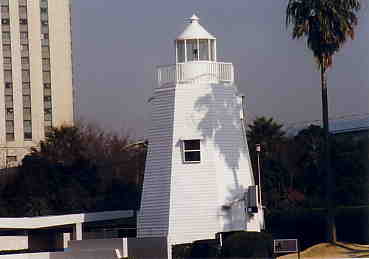Anorisaki Lighthouse on:
[Wikipedia]
[Google]
[Amazon]
is a
Lighthouses in Japan
 Lighthouses completed in 1873
Transport buildings and structures in Mie Prefecture
Lighthouses in Japan
Museums in Mie Prefecture
Lighthouse museums in Japan
Shima, Mie
1873 establishments in Japan
{{lighthouse-stub
Lighthouses completed in 1873
Transport buildings and structures in Mie Prefecture
Lighthouses in Japan
Museums in Mie Prefecture
Lighthouse museums in Japan
Shima, Mie
1873 establishments in Japan
{{lighthouse-stub
lighthouse
A lighthouse is a tower, building, or other type of physical structure designed to emit light from a system of lamps and lens (optics), lenses and to serve as a beacon for navigational aid for maritime pilots at sea or on inland waterways.
Ligh ...
on the top of Shima Peninsula in the city of Shima, Mie Prefecture
is a Prefectures of Japan, prefecture of Japan located in the Kansai region of Honshu. Mie Prefecture has a population of 1,781,948 () and has a geographic area of . Mie Prefecture is bordered by Gifu Prefecture to the north, Shiga Prefecture an ...
, Japan
Japan is an island country in East Asia. Located in the Pacific Ocean off the northeast coast of the Asia, Asian mainland, it is bordered on the west by the Sea of Japan and extends from the Sea of Okhotsk in the north to the East China Sea ...
.
History
The Anorisaki Lighthouse was designed and constructed by British engineerRichard Henry Brunton
Richard Henry Brunton FRGS MICE (26 December 1841 – 24 April 1901) was a British engineer known as the "Father of Japanese lighthouses". Brunton was born in Muchalls, Kincardineshire, Scotland. He was employed by the government of Meiji pe ...
. Work began in late 1871. It was first lit on April 1, 1873. It is the first lighthouse in Japan to use a rotating Fresnel lens
A Fresnel lens ( ; ; or ) is a type of composite compact lens (optics), lens which reduces the amount of material required compared to a conventional lens by dividing the lens into a set of concentric annular sections.
The simpler Dioptrics, d ...
. The octagonal structure was built of Zelkova serrata
''Zelkova serrata'' (Japanese zelkova, Japanese elm, keyaki, or keaki; or ; zh, s=榉树, t=櫸樹, p=jǔshù; ) is a species of the genus ''Zelkova'' native plant, native to Japan, Korea, eastern China and Taiwan.Flora of China''Zelkova serr ...
wood and had a total height of 10.6 metres.
During his career in Japan, Brunton constructed 25 lighthouses from far northern Hokkaidō
is the second-largest island of Japan and comprises the largest and northernmost prefecture, making up its own region. The Tsugaru Strait separates Hokkaidō from Honshu; the two islands are connected by railway via the Seikan Tunnel.
The ...
to southern Kyūshū
is the third-largest island of Japan's four main islands and the most southerly of the four largest islands (i.e. excluding Okinawa and the other Ryukyu (''Nansei'') Islands). In the past, it has been known as , and . The historical regio ...
, each with a different design. Although Anorisaki Lighthouse was the 20th of the 25 built by Brunton, it was the oldest with a wooden construction.
Since its construction in the late 19th century, Anorisaki Lighthouse was relocated twice. The lighthouse was first relocated in 1911 due coastal erosion
Coastal erosion is the loss or displacement of land, or the long-term removal of sediment and rocks along the coastline due to the action of Wind wave, waves, Ocean current, currents, tides, wind-driven water, waterborne ice, or other impacts ...
, being moved five miles further inland, and then again in 1948, when the original structure was replaced with a more modern design and relocated to the Museum of Maritime Science in Tokyo.
The modern replacement was completed in August 1948 and is a square ferro-concrete structure with a height of 12.7 metres. The lens was upgraded to a 4th order Fresnel in 1950.
The lighthouse was fully automated and has been unattended since October 1988. Since April 29, 2004, it has been open to the public for tours, with a small museum attached containing displays about the filming of the 1957 Japanese movie ''Times of Joy and Sorrow
, also titled ''The Lighthouse'' in the UK, is a 1957 Japanese drama film written and directed by Keisuke Kinoshita.
Plot
In 1932, a young lighthouse keeper returns from his father's funeral with a new bride, who quickly learns the importance of ...
''.
See also
* List of lighthouses in JapanReferences
References
*Brunton, Richard. ''Building Japan, 1868–1879''. Japan Library, 1991. *Pedlar, Neil. ''The Imported Pioneers: Westerners who Helped Build Modern Japan''. Routledge, 1990.External links
Lighthouses in Japan
 Lighthouses completed in 1873
Transport buildings and structures in Mie Prefecture
Lighthouses in Japan
Museums in Mie Prefecture
Lighthouse museums in Japan
Shima, Mie
1873 establishments in Japan
{{lighthouse-stub
Lighthouses completed in 1873
Transport buildings and structures in Mie Prefecture
Lighthouses in Japan
Museums in Mie Prefecture
Lighthouse museums in Japan
Shima, Mie
1873 establishments in Japan
{{lighthouse-stub